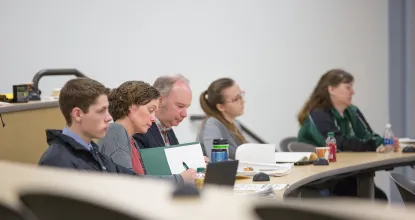
University Vision Statement
Northern Michigan University challenges its students and employees to think independently and critically, develop lifelong learning habits, acquire career skills, embrace diversity and become productive citizens in the regional and global community.
Northern Michigan University will become the university of choice in the Midwest for students seeking a quality academic program with individualized attention in a high-tech learning environment.
The Academic Affairs Division supports the mission of the university by encouraging excellence and innovation in teaching, scholarship, student development and community engagement. The division strives to prepare students for a lifetime of professional and community contributions in an increasingly interdependent and culturally diverse world.
Academic Affairs Vision Statement
The academic curriculum and the scholarship that supports it will provide an intellectual foundation for life-long learning, problem solving and career development. This curriculum will feature a rich learning environment that energizes the faculty-student relationship and creates an essential bridge from theory to practice.
There are four key concepts that support the curricular vision:
Intellectual Foundation
Intellectual foundation includes a curriculum focusing on reasoning skills, humanistic and scientific inquiry, technological and writing skills along with cultural and historical knowledge. This curriculum will provide a rich context for life-long learning and problem-solving that will serve as a foundation for any career an NMU graduate may pursue.
Career Preparation and Development
Career preparation and development is grounded in the University’s commitment to provide and support high quality academic and technical programs that are relevant to societal needs and challenges and that meet the needs of a global business environment. It provides the NMU graduate with the educational qualifications, skills and flexibility necessary to compete and succeed in a rapidly changing environment.
Active Learning Model
An active learning model engages students in higher-order thinking tasks such as discovery, analysis, synthesis, and evaluation. Active learning connects faculty scholarship to the student learning experience. In addition to engagement in the classroom, it also includes the practical application of knowledge through activities such as internships, practica, academic service learning and field experiences.
Community Engagement
Community engagement fosters collaboration between the students’ experience of the curriculum and communities outside the university at the local, state, regional, national and global levels for the exchange of knowledge, experiences, and resources in a context of partnership and reciprocity.
